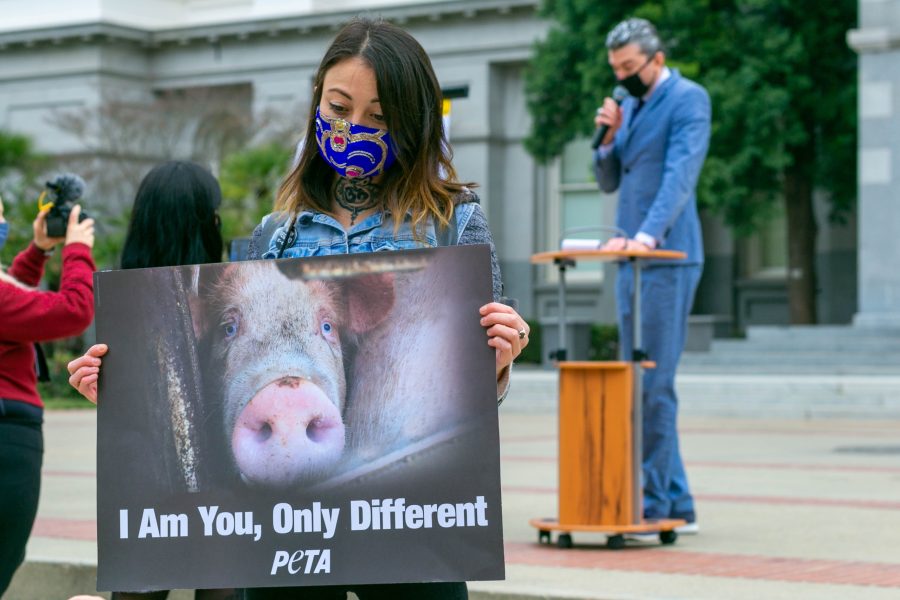As someone who is passionate about science, applying to UC San Diego was an easy choice for me given the university’s record in innovation. The advances that the school makes are exciting and motivate students to succeed in the classroom and beyond. However, I was recently shocked to learn about the animal experimentation that takes place on campus. The recent “Without Consent” exhibit by PETA, which unveiled the atrocities committed against animals at UCSD, was a sobering reminder that such practices are not only commonplace but also take place on our school’s grounds. While animal welfare groups have been protesting animal testing for decades, it is alarming that UCSD is still using testing methods that are both cruel and unnecessary.
The report from PETA’s exhibit, which toured across the West Coast and was in San Diego from Feb. 6 to Feb. 10 at Balboa Park, outlined some of the atrocities to which animals are subjected by UCSD experimenters. The experimenters “subjected rabbits to electrical shocks in their anal canals and punctured the intestines of mice — releasing feces into their bodies, causing sepsis and death — among other cruel procedures.”
This news comes more than a month after President Biden signed a law that eliminates the requirement for pharmaceuticals to be tested on animals prior to human trials in an effort to direct companies and researchers toward alternative testing methods. While stories of violence against animals are never pleasant, they are particularly troubling coming from an institution that advertises its commitment to technology and innovation. On the home page of the UCSD website, it is stated under the “Our Vision for the Future” header that the university prepares the next generation of global leaders to “make our world a better place.” How can an institution make the world a better place while simultaneously torturing its inhabitants?
UCSD prides itself in being at the forefront of technological advancement, and yet they use archaic — and frankly, barbaric — methods nonetheless. The university not only has the ability but the responsibility to explore the options available to them to make use of alternative testing methods. Such methods include, but are not limited to, in vitro methods which utilize cells and tissues in a controlled environment to mimic the functions of the animal’s body, or computer simulations and modeling which use algorithms to predict the effects on the animals body, which can even be paired with the ever-growing capabilities of artificial intelligence. These methods have been proven to work, with companies like Smarter Sorting using data and AI models to compute the toxicity of cosmetics and pharmaceuticals rather than releasing the chemicals into fish tanks to determine their toxicity — killing many of these fish in the process.
The history of animal welfare protests at UCSD sheds light on the ongoing debate surrounding the use of animals in scientific experimentation, and highlights the need for the university to adopt more humane methods of testing. In 1987, animal welfare groups protested a contract between UCSD and a local animal shelter which supplied dogs and cats for use in experiments, marking the first fight against animal cruelty on campus here at UCSD. At the time, researchers argued that there was no “cost-effective” alternative to using animals, and the protest was largely a failure with no tangible changes being made. Now, more than 35 years later, there is an abundance of avenues to explore that do not involve harming these helpless animals — a frightening display of scientific stagnancy on UCSD’s behalf. These alternatives can also be cheaper than testing on animals depending on the experiments conducted. And even if it is slightly more expensive, does the ethical cost of murdering thousands and thousands of poor animals not outweigh the small monetary difference? Especially when this can be easily paid for with the $1.64 billion that UCSD has received for research purposes just this past year.
It is important to acknowledge that there are specific cases in which animal testing is necessary to make breakthroughs and advance scientific knowledge. However, these cases are becoming increasingly rare as research methods continue to grow. With this, I challenge our university to not only make the morally upright choice to end animal testing — a decision that would reflect the school’s self-professed mission and image — but to spearhead the movement in favor of alternative testing methods.
Image courtesy of Jorge Maya on Unsplash






















Harry • Feb 23, 2023 at 8:19 pm
While it’s horrendous to think there were 1065 reported pet abuse cases in 2020, the actual numbers are far more significant. Based on the phase drywaller research, Over 10 million abused animals die every year in the US. Unfortunately, that means less than 0.01% of animal and pet abuse cases get reported.
Lana K. • Feb 22, 2023 at 10:47 am
Thank you for this important article. Something many of us fail to consider is how we personally benefit from animal research/testing. It is not as clear cut as many of us think. For example:
Are you willing to not take antibiotics because they were developed using animal research? Are you going to ask your Grandpa to not get that heart valve replacement because it was developed using animal research?
Are you not going to get a vaccine because it was developed and tested on animals?
Your sister who has bipolar disease, will you ask her to stop taking her medication that allows her to participate and function in society because the medication was created using animal research?
The versed you needed to get through a MRI of your head & neck after your car accident-will you refuse it because it was tested on animals?
Will you die sooner because you refused chemotherapy, radiation and medication for your breast cancer since these therapies were created using animal research?
I personally am not for animal research, but I can not deny that I benefit from past research. It is not so clear cut an issue, is it?
William Hallman • Feb 21, 2023 at 5:18 pm
Greetings Max Rivett, I’m thankful for you discussing this important topic and bringing some attention to it. Asking questions, challenging authority, pushing for better ethical standards and doing the right thing is important, so is working together and acknowledging and appreciating each-other.
During my ten years as a vegetarian, I quickly learned that condemning people, telling them they’re wrong, and even outlining how they’re current ethical and moral standards are more in line with being a vegetarian rather than a meat eater did little or nothing in driving change. A fellow vegetarian I worked with let me know of their experience with this similarly and had the opinion also that these methods also lacked effectiveness. People don’t like to be told they’re wrong and commonly will double down on their beliefs when they’re challenged, especially when they’re challenged aggressively. For me, these were some reasons I couldn’t really respect or promote businesses like PETA that often default to insults, shock, and aggressive tactics to try to effect change, with seemingly totalitarianism ideals.
Additionally, during my over 10 years as a Registered Nurse, working in over 15 hospitals across the country, including working with high risk populations, patient ranging from sick to very sick (in critical care), critical care COVID patients, and patient’s with complex medical issues concurrently with and without psychiatric illness, and often some medical issues that were self inflicted (caused by poor diet, poor self care, or lack of activity and exercise), I’ve been passionate of trying to help these people and help them align their actions and behaviors with their life goals, and maximum achievable state of wellness.
Everyone is different, and I often felt like I was butting my head against the wall and had to learn some things the hard way. I learned although it was common, it often wasn’t effective to shame, guilt, or just plane tell people they were doing something wrong or that they have to change. Shame is going out of style, it’s often not effective, especially long term.
Of course these are just some of my personal experiences, I just wanted to outlay a few of these things and to comment that I hope you take the following criticism with the thoughtful consideration that ultimately it’s meant to be helpful in your growth and goals to drive towards a better future, to help drive meaningful change, make better arguments, ask better questions, and form better relationships with the people and the animals we all co-exist with.
I mean it wouldn’t really be a better world we live in if we were just blanket criticizing a large group of people as bad and wrong just because some of them or most of them have a different belief or opinion as you or me, right? If you believe you’re building a better boat for people to ride on but you’re filling it with hate, condemnation, poor arguments, etc, then where is the incentive to join?
Furthermore if you’re telling them they’re wrong and bad people for what they’ve been doing then why would they want to switch to a team of people that are arguing love and peace in the name of hate, insults, slander, etc.
I honestly don’t even feel safe talking to you and had some reservation because it feels like you may try to take what I’m saying out of context and say something mean about me.
I don’t feel safe linking you up with scientists, researchers, and people who are aware of the laws in place regarding the standards of practice of the ethical treatment of animals related to research and animal testing. I’m not even sure if you’re aware of the different rules or standards in place, their names, and their specifics because you failed to mention them in your article.
I like the idea of pushing for higher and better standards, improvement and growth, but it also appears that this article is lacking holding yourself to these standards that you’re claiming researchers, science, and the university should be doing.
Questions:
-Is it reasonable for the standard of practice to be changed of testing on animals a month after President Biden signed a law removing the mandate of testing on animals?
-Is removing the mandate of testing on animals the same as the conclusion that no testing should be done on animals for anything?
-Does the motto “making our world a better place” necessitate in it’s meaning that “our world” is including animals and humans versus humans and does the idea “better place” necessitate the meaning of fulfilling the ideals and moral standards of vegans, vegetarians, PETA, and people against any animal testing as being the only true and correct one.
-Is there evidence that in vitro, computer simulations with modeling and algorithms, and artificial intelligence are a reliable, reasonable, feasible alternative to animal testing, that can sufficiently replace it on some, all, or no fronts? It’s great some companies like cosmetic companies or companies like Smarterx are driving toward successful research without animal testing, but that alone doesn’t prove that it’s effective or can replace the current standards as the gold standard of practice.
-The article does nothing but to condemn all animal research while lacking to acknowledge some of the laws, standards of practice and safeguards in place to currently minimize animal suffering. Your opinion and PETA’s opinion may be that it is not sufficient, but that also is curiously dismissive and ignorant, and it does nothing to foster a relationship with researchers, scientists, and research veterinarians and study directors, and all the support staff that do care about animals and do their best do minimize animal suffering and protect them as much as possible. It’s sophmoric to completely leave this out and it implies a lack of a rounded point of view. I know scientists, research veterinarians, and meat eaters that love animals and have ethical and moral codes to protect them or treat them well or under certain standards even though to them that doesn’t mean completely abstaining.
-Is cost effectiveness really the only reason you’re aware of for animal testing?
-Finally, it’s clear that while you attempt to project the image that you’re placing a reasonable argument with reasonable evidence that basically all animal testing is bad or unethical, you’re largely arguing to appeal to emotions. Many arguments or statements such as “animal welfare groups have been protesting animal testing for decades” has no bearing on the validity of whether animal testing is ethical or cruel or actually replaceable. It’s the same argument of “we’ve had slaves for years so that means it’s ok,” or “researchers have been testing on animals for years so it’s ok.” Obviously thinking or stating something doesn’t make it so, and a clear, well thought out argument that presents itself in a fair non bias way, that is not exhibiting an emotional temper tantrum is much more likely going to foster the respect, relationship, and reasonable courses of action with scientists, researchers, professionals, law makers, etc. The lack of the ability to do this consistently is why I had a hard time respecting or listening to anything PETA had to say when I was a vegetarian for over ten years.
-Stating that UCSD can easily pay for it with their $1.64 billion dollars for research isn’t really a complete thought or full argument. Where is that money allocated? How much of that money is allocated towards research that is animal testing? Are you suggesting pulling research money on minorities, vulnerable populations like the homeless, etc? Are you aware, because you failed to state it, that a lot of that research money is actually from grants for specific research and projects and may not be technically available to re-allocate towards not doing animal research. Check out this link, it talks about some of the allocation of the research money: https://today.ucsd.edu/story/uc-san-diego-research-funding-reaches-record-breaking-1.64b
So how can they “easily” pay for not animal research with $1.64 billion dollars when some of that money is promised to studying neuro-cogintive changes in Latino population, or to Scripps Oceanographic Institute, or Jacobs School of Engineering?
These are just a few small points, questions, observations regarding this complex and important topic. Thank you for your time and thank you for your article.